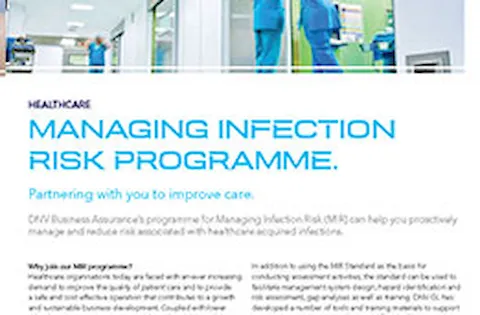Infektionshygiejne - service
Helping you to proactively manage and reduce risk associated with healthcare acquired infections.
Why join our Managing Infection Risk (MIR) programme?
Healthcare organisations today are faced with an ever increasing demand to improve the quality of patient care, and to provide a safe and cost effective operation that contributes to a growth and sustainable business development. Coupled with lower risk tolerance, more intense scrutiny by stakeholders and the community, and with the need to stay ahead of the game, many healthcare institutions need to demonstrate careful management of infection risks and ultimately to reduce healthcare associated infections (HAI). In order to achieve this, organisations need to adopt a structured and robust approach to manage these challenges, measure their performance and manage change.
The Managing Infection Risk Standard was developed by DNV- Business Assurance to provide a modern, comprehensive and practical framework to help organisations improve their management of infection risk. It adopts a structure based upon 18 elements addressing all areas associated with the design, operation and management of healthcare facilities. The standard is compatible with the World Health Organisation (WHO), the US Centers for Disease Control (CDC) and other national guidelines to allow better integration and ease of implementation.
In addition to using the MIR Standard as the basis for conducting assessment activities, the standard can be used to facilitate management system design, hazard identification and risk assessment, gap analyses as well as training. We have developed a number of tools and training materials to support organisations wishing to implement MIR and will continue to add to this toolbox in the coming years.
Our Programme
The MIR programme involves three sequential stages:
Establishing a baseline
This stage builds awareness of the MIR approach among key staff involved in managing infection risk. Our alpha assessment provides a snapshot of the perception regarding the current situation of managing infection risk, based on the opinions of a cross-section of the organisations personnel and using the elements of the MIR standard as a basis. In addition there is a focus on gathering baseline surveillance information related to HAIs and the associated costs that are incurred as a result.
MIR Partner and learning collaborative
Once a baseline has been established, and following a commitment by the organisation towards implementing MIR, then it is recognized by us as a MIR Partner and gains access to the learning collaborative. MIR Partners have a tailored programme developed to suit their own needs, but a key activity will be involvement in a learning collaborative.
The learning collaborative involves face-to-face as well as electronic-based training and has a focus on understanding the MIR requirements as well as tools and methodologies that will be required to implement a risk based system across an organisation. The learning collaborative also facilitates network building and learning between MIR Partners such that they can capitalize on one another’s infection control related resources, experiences and skills. activity will be this will involve one or more GAP assessments by DNV - Business Assurance surveyors as well as gaining access to a learning collaborative.
The initial GAP assessment would be an in-depth review whereby all elements would be addressed in detail with a view to identifying missing or broken processes that would require resolution prior to becoming a MIR Centre of Excellence. Additional GAP assessments may be system-wide or they may be targeted at individual processes or departments.
MIR Center of Excellence
Center of Excellence (CoE) status would be achieved through demonstrating conformity with the requirements of the MIR standard. Focus for hospitals awarded CoE status would be on continual improvement with a three-year cycle of annual external assessments by Business Assurance.
The benefits
Our MIR programme enables organisations to improve performance through the adoption of recognized good practice in infection risk management. Organisations that enter the programme are immediately recognized as “DNV MIR Partners” and are given access to the learning collaborative. Involvement as a DNV MIR partner will help you to:
- Reduce the potential for harm to patients, visitors and staff;
- Improve business performance through reductions in infection risk;
- Improve MIR performance beyond legislative requirements and promote continuous improvement through a structured approach;
- Create significant competitive advantage through reduction and prevention of errors, leading to better reputation and higher cost savings;
- Enhance confidence and satisfaction in patient care and quality.






